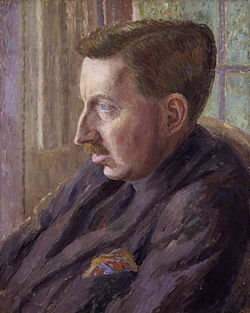E.M. Forster Quote
Human beings have their great chance in the novel. They say to the novelist: Recreate us if you like, but we must come in, and the novelist’s problem, as we have seen all along, is to give them a good run and to achieve something else at the same time. Whither shall he turn? not indeed for help but for analogy. Music, though it does not employ human beings, though it is governed by intricate laws, nevertheless does offer in its final expression a type of beauty which fiction might achieve in its own way. Expansion. That is the idea the novelist must cling to. Not completion. Not rounding off but opening out. When the symphony is over we feel that the notes and tunes composing it have been liberated, they have found in the rhythm of the whole their individual freedom. Cannot the novel be like that? Is not there something of it in War and Peace?-—the book with which we began and in which we must end. Such an untidy book. Yet, as we read it, do not great chords begin to sound behind us, and when we have finished does not every item—even the catalogue of strategies—lead a larger existence than was possible at the time?
Human beings have their great chance in the novel. They say to the novelist: Recreate us if you like, but we must come in, and the novelist’s problem, as we have seen all along, is to give them a good run and to achieve something else at the same time. Whither shall he turn? not indeed for help but for analogy. Music, though it does not employ human beings, though it is governed by intricate laws, nevertheless does offer in its final expression a type of beauty which fiction might achieve in its own way. Expansion. That is the idea the novelist must cling to. Not completion. Not rounding off but opening out. When the symphony is over we feel that the notes and tunes composing it have been liberated, they have found in the rhythm of the whole their individual freedom. Cannot the novel be like that? Is not there something of it in War and Peace?-—the book with which we began and in which we must end. Such an untidy book. Yet, as we read it, do not great chords begin to sound behind us, and when we have finished does not every item—even the catalogue of strategies—lead a larger existence than was possible at the time?
Related Quotes
About E.M. Forster
Considered one of the most successful of the Edwardian era English novelists, he was nominated for the Nobel Prize in Literature in 22 separate years. He declined a knighthood in 1949, though he received the Order of Merit upon his 90th birthday. Forster was made a Member of the Order of the Companions of Honour in 1953, and in 1961 he was one of the first five authors named as a Companion of Literature by the Royal Society of Literature.
After attending Tonbridge School, Forster studied history and classics at King's College, Cambridge, where he met fellow future writers such as Lytton Strachey and Leonard Woolf. He then travelled throughout Europe before publishing his first novel, Where Angels Fear to Tread, in 1905. The last of his novels to be published, Maurice, is a tale of homosexual love in early 20th-century England. While completed in 1914, the novel was not published until 1971, the year after his death.
Many of his novels were posthumously adapted for cinema, including Merchant Ivory Productions of A Room with a View (1985), Maurice (1987) and Howards End (1992), critically acclaimed period dramas which featured lavish sets and esteemed British actors, including Helena Bonham Carter, Daniel Day-Lewis, Hugh Grant, Anthony Hopkins and Emma Thompson. Director David Lean filmed another well-received adaptation, A Passage to India, in 1984.
